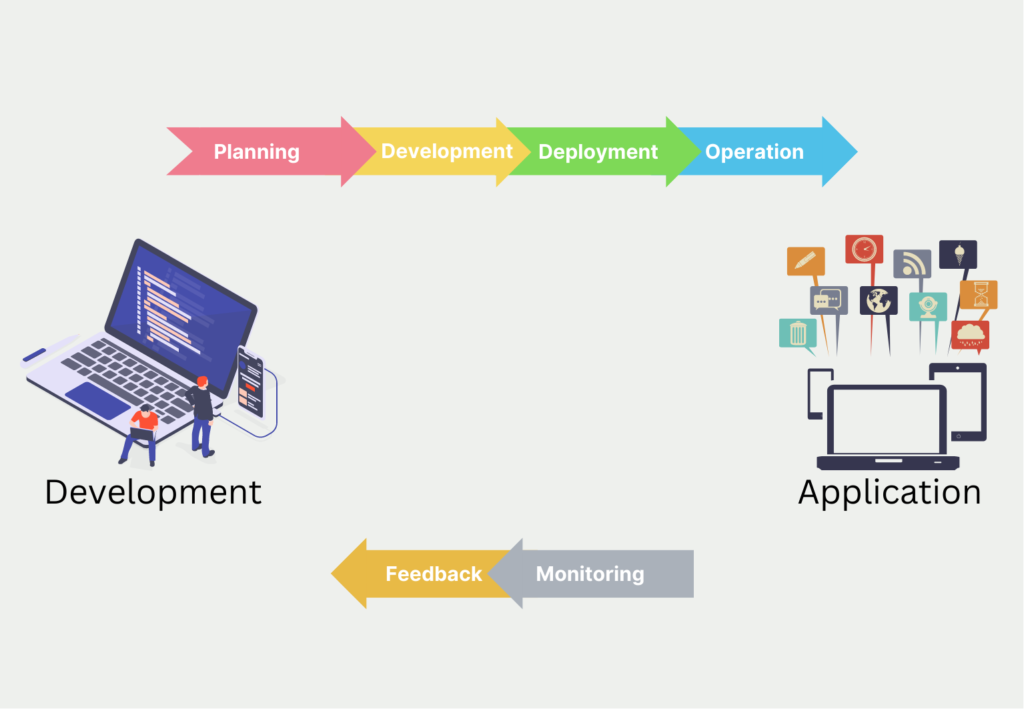The role of the DevOps Engineer is a new career field that has evolved in IT to make the process of software development more efficient and better. The DevOps Engineer’s responsibility here is to ensure that development (Development) and IT operations (Operations) merge as smoothly as possible.
What is DevOps?
The central point of DevOps involves the team working together from the creation of a prototype to the live launch of the finished application and far beyond. This is done by defining different team roles to ensure a smooth and fast process.
This approach differs from previous practices in that now the development team and the operations team work closely together. Previously, applications were created by developers and once they went live, they were handed off to the operations team, which was tasked with ensuring the accessibility and performance of the service. However, valuable information is lost between the two teams, such as improvement suggestions from the operations team.

Depending on the application, security or quality assurance experts can also be brought into the project team in addition to these departments. Especially if aspects from these areas are of particular importance for the project.
The team uses practices that are originally known as process automation and can also be applied to software development. The focus is on an endless loop of processes that are run through step by step.
What are the tasks of a DevOps Engineer?
As a DevOps Engineer, you are a mixture of a developer and a system administrator. This means that you develop software, but at the same time ensure that the new program integrates well with the existing software and can thus maintain operations.
Specifically, this may include the following tasks, for example:
- As the primary responsibility, you will ensure that the DevOps process is established and implemented. In doing so, you will work with programs such as Git and other version controls. In doing so, you are the central contact person for other software developers in case of problems with the various code versions.
- In general, as a DevOps Engineer, you oversee the entire process from developing new code, testing, deploying, and running.
- Additionally, you try to automate as many processes as possible. This includes, for example, automatic deployment pipelines so that new functionalities can be quickly deployed in a productive environment.
What training do I need to become a DevOps Engineer?
You can start as a DevOps Engineer with a completed apprenticeship as well as a degree. Basically, you should have built up knowledge in the field of specialist information technology, business information technology or pure computer science.
Furthermore, sound knowledge of various programming languages, such as Python or Ruby, is essential as a DevOps Engineer. Additionally, you should be interested in server administration or even have already gained some experience with server administration.
In addition to these technical skills, working in a team is essential for a DevOps Engineer. Therefore, you should be a team player who manages to clearly formulate and communicate requirements.
How may the career path of a DevOps engineer look like?
The career path of a DevOps engineer can vary depending on the organization and individual goals. Here is a general overview of the typical career path of a DevOps engineer:
- Entry-level: At the entry level, DevOps engineers are typically responsible for building and maintaining infrastructure, implementing CI/CD pipelines, and monitoring system performance. They work closely with developers and operations teams to ensure the smooth functioning of software development and delivery.
- Mid-level: At the mid-level, DevOps engineers typically take on more responsibility, such as managing multiple projects and teams, implementing new technologies, and driving innovation. They may also specialize in certain areas like security, cloud computing, or automation.
- Senior-level: At the senior level, DevOps engineers are responsible for strategic planning and decision-making, as well as managing large-scale projects and teams. They are expected to have deep knowledge of the organization’s technology stack and to provide guidance to junior team members.
- Management: Some DevOps engineers may choose to move into management roles, such as DevOps Manager or Director of DevOps. In these roles, they are responsible for managing the entire DevOps team, as well as collaborating with other teams and stakeholders to ensure the success of software development and delivery.
- Specialization: Some DevOps engineers may choose to specialize in certain areas like security, cloud computing, or automation. This allows them to become subject matter experts in their field and provide valuable insights and guidance to their team.
Overall, the career path of a DevOps engineer is flexible and can vary based on individual goals and organizational needs. With the increasing demand for DevOps expertise, there are many opportunities for growth and advancement in this field.
What other data science careers are there?
Data Analyst
The Data Analyst works in the field of Data Science jobs mainly in market research, in the marketing department, or in other departments of a company that analyze data.
Tasks: Data analysts collect data from internal and external sources, sometimes even by conducting or commissioning surveys. The main task is then to prepare the results in such a way that they can be understood by a wide audience.
- Mining data from internal and external sources
- Preparing reports for all levels of management
- Highlighting the important information that could be valuable for further investigation
Qualifications: Data analysts should have solid skills and knowledge in database languages, Business Intelligence tools, and spreadsheet tools. Further knowledge in programming languages and Machine Learning are a plus.
- Database Languages like SQL
- Spreadsheet tools like Microsoft Excel or Google Sheets
- Data visualization tools like Power BI or Tableau
Data Scientist
The Data Science job of “Data Scientist” goes beyond pure analysis and seeks to establish the statistical and operational relationships that result from the data.
Tasks: Data Scientists collect data from various sources to solve business-related problems using statistical algorithms.
- Collecting data from various sources and transforming it into one common format
- Enabling and supporting data-driven decisions
- Visualizing the results to make them understandable for a non-tech audience
- Researching trends and structures in data that can provide insight into relationships
Qualifications: Data Scientists have solid knowledge in mathematics, computer science, and detecting trends and patterns.
- Machine Learning / Deep Learning
- Data Visualization
- Pattern Recognition
- Data Preparation
- Upcoming: Text Analytics
Data Architect
In data science jobs, the data architect ensures that there is a uniform architecture in the company according to which data is collected, stored, and analyzed.
Tasks: Data Architects sets the guidelines on how data is collected, stored, and accessed in an organization.
- Organizing data migration from various sources into one data warehouse or data lake
- Designing and realizing database solutions
- Preparing data architecture reports for upper management
- Ensuring the functionality of data architecture solutions with regular tests
Qualifications: Data Architects need to have basic technical knowledge and advanced project management skills.
- Business Understanding
- Project Management Skills
- Legal Knowledge, i.e. data protection laws
- Advanced knowledge of database solutions
Database Manager
In Data Science jobs, the Database Manager is responsible for setting up the databases used and keeping them functional.
Tasks: Database Managers make sure all database solutions run smoothly and are up-to-date.
- Keeping up with current developments, e.g. new software installation
- Protecting databases and their data from hackers
- Preparing for system downtimes, such as power outage
- Configuring hardware, e.g. to increase the storage capacity
Qualifications: Database Managers should be able to take over responsibility and be experienced with several different database solutions.
- Leadership Skills
- Strategic Planning
- Solid Knowledge of Database Solutions
- Creative and Analytical Thinking
Security Engineer
In Data Science jobs, the Security Engineer ensures that the tools used are safe for employees to use and that there are no hazards.
Tasks: Security Engineers are expected to secure an organization’s network from potential security threats.
- Implementing new security solutions, e.g. firewalls
- Identifying potential future threats and security risks
- Finding security weaknesses and making them safe
- Documenting security certification
Qualifications: Security Engineers have IT-related degrees and potentially a technical background. Some jobs may require certifications in this field.
- Knowledge of various security-related fields
- Business Thinking to provide cost-effective solutions
- Time-Management
- Organizational Skills
Data Engineer
In Data Science jobs, the Data Engineer is concerned with ensuring that the data is cleaned and stored in the databases.
Tasks: Data Engineers are responsible for the data transport from various sources into one common database model. This involves the so-called ETL process (Extract, Transform, Load).
- Creating and Monitoring Data Pipelines
- Preparing Data for Data Analysts and Data Scientists
- Building the infrastructure to implement ETL processes
- Optimizing the data delivery process
Qualifications: Data Engineers need knowledge of various programming languages which are used for data warehousing solutions and data preparation.
- Programming languages like Python or Java
- Database Query Languages, like SQL
- Understanding distributed systems
- ETL tools
This is what you should take with you
- A DevOps Engineer is a mix of a software developer and a system administrator who ensures that the DevOps process is implemented in the company.
- The DevOps Engineer’s tasks include automating the deployment and testing process, as well as managing Git or other version control.
- Ideally, you will have completed training or studies in information technology or business informatics.
What is Collaborative Filtering?
Unlock personalized recommendations with collaborative filtering. Discover how this powerful technique enhances user experiences. Learn more!
What is Quantum Computing?
Dive into the quantum revolution with our article of quantum computing. Uncover the future of computation and its transformative potential.
What is Anomaly Detection?
Discover effective anomaly detection techniques in data analysis. Detect outliers and unusual patterns for improved insights. Learn more now!
What is the T5-Model?
Unlocking Text Generation: Discover the Power of T5 Model for Advanced NLP Tasks - Learn Implementation and Benefits.
What is MLOps?
Discover the world of MLOps and learn how it revolutionizes machine learning deployments. Explore key concepts and best practices.
Other Articles on the Topic of DevOps Engineers
You can find many interesting job offers as a DevOps Engineer on Stepstone, for example.

Niklas Lang
I have been working as a machine learning engineer and software developer since 2020 and am passionate about the world of data, algorithms and software development. In addition to my work in the field, I teach at several German universities, including the IU International University of Applied Sciences and the Baden-Württemberg Cooperative State University, in the fields of data science, mathematics and business analytics.
My goal is to present complex topics such as statistics and machine learning in a way that makes them not only understandable, but also exciting and tangible. I combine practical experience from industry with sound theoretical foundations to prepare my students in the best possible way for the challenges of the data world.





